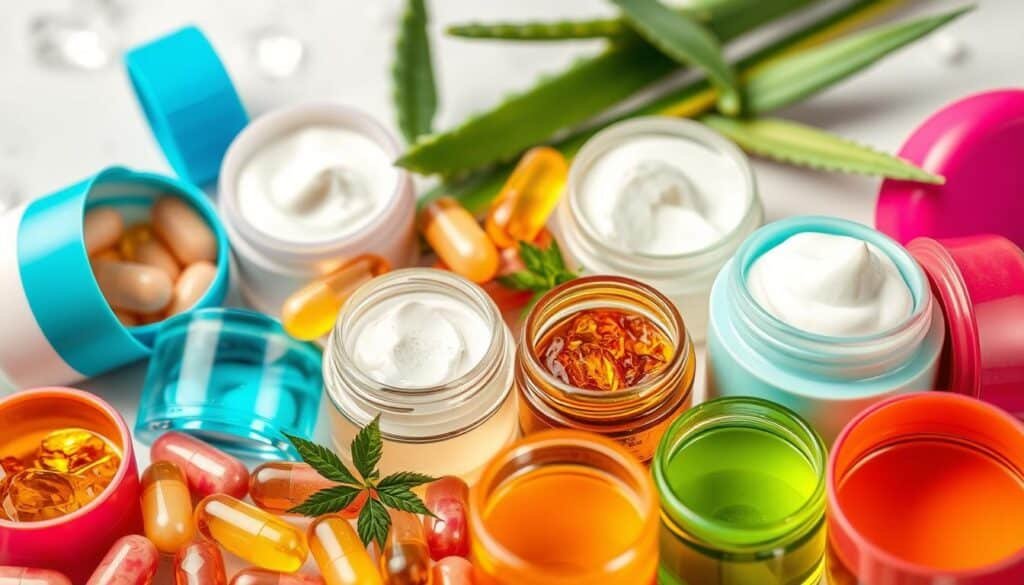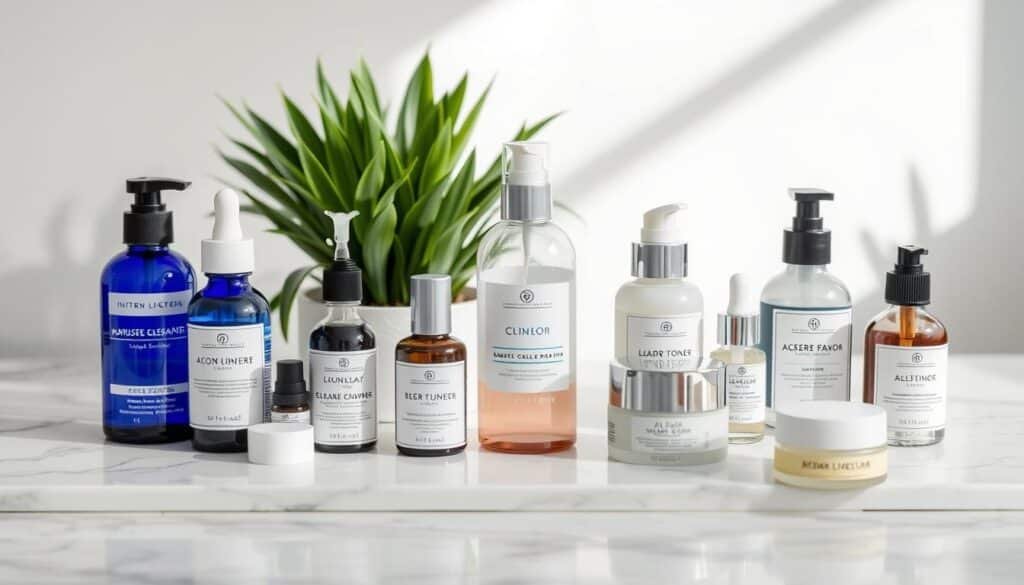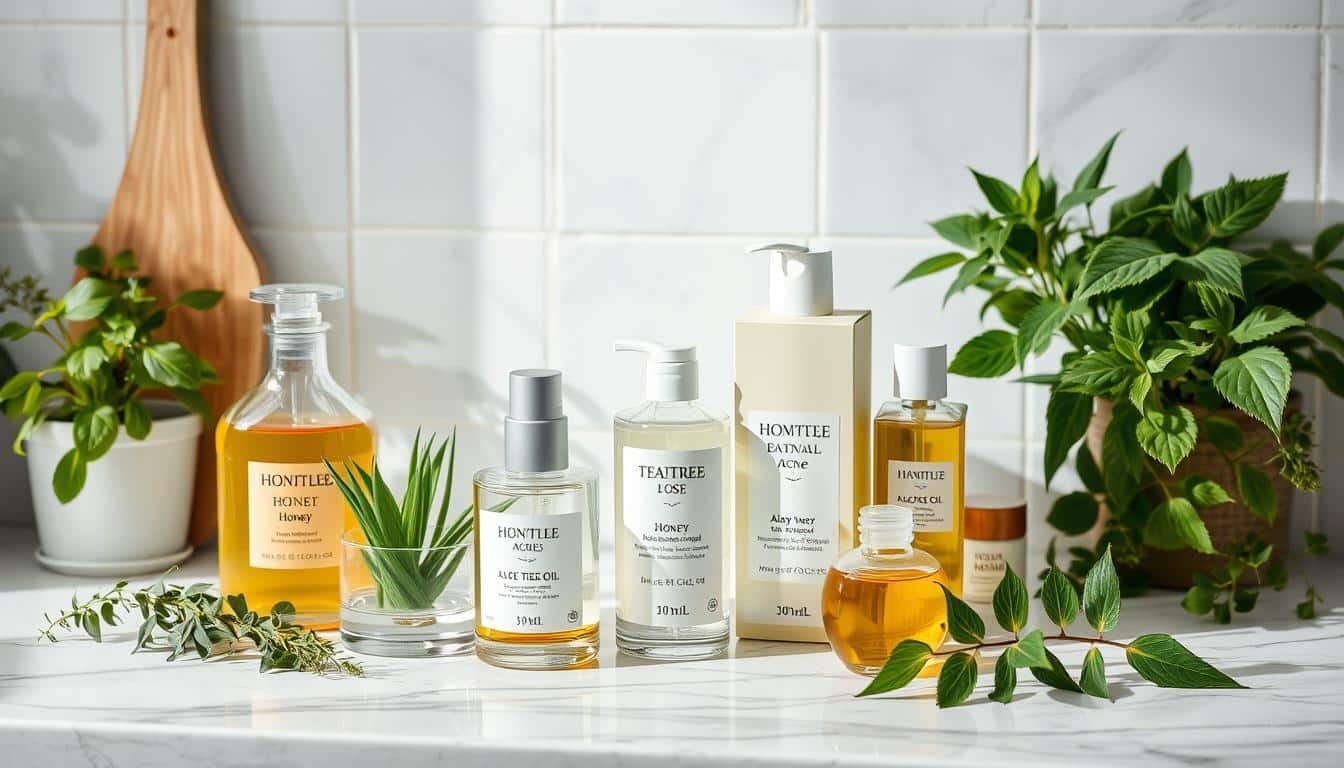Acne Treatment Remedies is a common skin issue, affecting about 85 percent of young adults worldwide. There are many effective treatments available. These include over-the-counter products, prescription meds, and natural remedies. They work to reduce inflammation, kill bacteria, and clear pores for healthier skin.
While treatments like salicylic acid and benzoyl peroxide work well, they can cause side effects. These include dryness, redness, and irritation. This has led many to look for alternative solutions. A 2017 study found that 77 percent of acne patients tried natural or home-based treatments.
Natural options like zinc supplements and tea tree oil have shown good results in studies. So have over-the-counter products like aloe vera and green tea extract. Remember, it may take 4-8 weeks to see improvements with new treatments.
Key Takeaways
- Acne affects an estimated 85% of young adults, making it a common skin condition.
- Conventional acne treatments can be effective but may cause side effects like dryness and irritation.
- Natural and alternative acne remedies, such as zinc supplements and tea tree oil, have shown promising results in clinical studies.
- It’s important to be patient and give new acne treatments 4-8 weeks to work before evaluating their effectiveness.
- A combination of over-the-counter and natural remedies may be the most effective approach for achieving clear, healthy skin.
Understanding Acne: Causes and Types
Acne is a common skin issue. It happens when hair follicles get blocked by oil and dead skin. Knowing what causes it and the different types helps in treating it better.
Common Triggers of Acne Formation
Many things can lead to acne. These include:
- Genetics: If your family has acne, you might get it too.
- Hormonal changes: Changes in hormones, like during puberty or menstruation, can cause more oil and block pores.
- Diet: Eating foods high in sugar and dairy can make acne worse.
- Stress: Stress makes your body produce more oil, leading to clogged pores and acne.
- Medications: Some drugs, like corticosteroids and lithium, can cause or make acne worse.
Different Types of Acne Lesions
Acne can show up in many ways. These include:
- Whiteheads: These are closed comedones that look white because of trapped oil and dead skin.
- Blackheads: These are open comedones where the trapped oil and dead skin are exposed, looking like black dots.
- Papules: These are small, red bumps on the skin.
- Pustules: These are pus-filled, inflamed bumps.
- Nodules: These are big, painful lumps under the skin’s surface.
- Cystic acne: This is severe, deep, and painful acne that can cause scars.
Role of Bacteria and Oil Production
The Propionibacterium acnes (P. acnes) bacterium is key in acne. It grows in the oil of clogged pores, causing inflammation and acne. Too much oil, from hormonal imbalances, also blocks pores and makes acne worse.
“Understanding the underlying causes and different types of acne is the first step towards effective treatment and management.”
Over-the-Counter Active Ingredients for Acne Treatment

If you’re dealing with pesky acne, over-the-counter (OTC) treatments can be a great starting point. These products contain active ingredients that can effectively combat breakouts and promote clearer skin. Let’s explore some of the top OTC acne-fighting powerhouses:
- Benzoyl peroxide (2.5-10%): This ingredient works by killing acne-causing bacteria and removing excess oil from the skin. Studies show that lower strength benzoyl peroxide products (2.5%) can be just as effective as higher concentrations.
- Salicylic acid (0.5-2%): Salicylic acid is a key player in unclogging pores and exfoliating the skin, helping to prevent new breakouts. OTC salicylic acid products come in both leave-on and wash-off formulas.
- Adapalene (0.1%): Adapalene is a topical retinoid that works to prevent new acne formation by regulating skin cell turnover and keeping pores clear.
- Azelaic acid (10%): This natural compound has antibacterial and anti-inflammatory properties, making it effective in treating acne and fading dark spots.
When starting with OTC acne treatments, it’s best to start with lower concentrations to minimize skin irritation. Patience is also key, as it may take 2-3 months of consistent use to see visible improvements.
| Ingredient | Concentration | Mechanism of Action |
|---|---|---|
| Benzoyl peroxide | 2.5-10% | Kills acne-causing bacteria and removes excess oil |
| Salicylic acid | 0.5-2% | Unclogs pores and exfoliates the skin |
| Adapalene | 0.1% | Regulates skin cell turnover and keeps pores clear |
| Azelaic acid | 10% | Has antibacterial and anti-inflammatory properties |
Remember, choosing the right OTC acne treatment and using it consistently is key to achieving the desired results. It’s always a good idea to consult with a dermatologist if you have persistent or severe acne.
Acne Treatment Remedies: From Medical to Natural Solutions

Acne is a common skin issue that can be tough to handle. But, there are many ways to get clearer, healthier skin. You can try prescription meds or natural remedies. The key is to find what works best for your skin.
Prescription Medications and Their Effects
Topical retinoids like tretinoin and adapalene are often used for acne. They help clear pores, reduce swelling, and speed up cell renewal. Oral antibiotics, such as doxycycline and minocycline, target the bacteria causing acne. For severe cases, isotretinoin can be used to cut down oil and clear breakouts.
Natural and Home-Based Solutions
There are also natural acne remedies to try. Tea tree oil can kill the bacteria that cause acne. Green tea and honey have antibacterial and anti-inflammatory effects. Zinc supplements can also help reduce inflammatory acne.
Lifestyle Modifications for Acne Management
Changing your lifestyle can also help manage acne. A good skincare routine, stress management, and diet changes can improve your skin. Apple cider vinegar and witch hazel are home remedies, but more research is needed to confirm their effectiveness.
By trying different lifestyle changes for acne, you can manage your skin better. This approach can help you achieve the clear, radiant skin you want.
| Treatment Approach | Potential Benefits | Evidence of Effectiveness |
|---|---|---|
| Resveratrol (from red grapes) | Antibacterial activity against Cutibacterium acnes | Research shows resveratrol can inhibit the growth of this acne-causing bacteria. |
| Cucumbers | Skin soothing and hydrating effects | Cucumbers may have a calming effect on inflamed acne-prone skin. |
| Honey | Antibacterial and anti-inflammatory properties | Honey’s benefits may inhibit C. acnes growth and promote healing of acne. |
| Yogurt (probiotic) | Potential to inhibit C. acnes | Probiotics may help maintain a healthy skin microbiome and reduce acne. |
| Zinc supplements | Reduction in inflammatory acne lesions | Some patients notice improvement in acne within 8 weeks of zinc therapy. |
“Maintaining a proper skincare routine, managing stress, and making dietary adjustments can all contribute to improving the appearance and overall health of your skin.”
Essential Skincare Routine for Acne-Prone Skin

Managing acne needs a gentle, daily skincare routine. Start by washing your face twice a day with a mild, non-comedogenic cleanser. CeraVe Acne Foaming Cream Cleanser is a good choice. It has 4% benzoyl peroxide to clear acne without drying your skin too much.
Next, use a lightweight, oil-free moisturizer that won’t block pores. CeraVe AM Facial Moisturizing Lotion is a great option. It also has SPF 30 to protect your skin from the sun, especially when using acne treatments.
At night, use a retinol-based serum like CeraVe Resurfacing Retinol Serum. It has encapsulated retinol, licorice root extract, and niacinamide to improve your skin’s texture and reduce breakouts. End your routine with CeraVe PM Facial Moisturizing Lotion for extra hydration.
Being consistent is crucial for an acne skincare routine. Follow this gentle routine to see clearer, healthier skin. Avoid harsh products and over-scrubbing, as they can make your skin worse.
| Product | Purpose | Key Ingredients |
|---|---|---|
| CeraVe Acne Foaming Cream Cleanser | Gentle cleansing with acne-fighting properties | 4% benzoyl peroxide |
| CeraVe AM Facial Moisturizing Lotion | Lightweight, non-comedogenic moisturizer with sun protection | Broad-spectrum SPF 30 |
| CeraVe Resurfacing Retinol Serum | Improves skin texture and reduces breakouts | Encapsulated retinol, licorice root extract, niacinamide |
| CeraVe PM Facial Moisturizing Lotion | Hydrating and soothing nighttime moisturizer | Three essential ceramides, hyaluronic acid, niacinamide |
“Consistent use of a skincare routine for acne can help minimize acne flare-ups and treat existing breakouts.”
Targeting Specific Acne Concerns with Treatment Options

Acne is a complex skin condition with different forms. Each one needs its own treatment. Whether it’s hormonal acne, cystic breakouts, or acne scars, there are solutions for your specific concerns.
Solutions for Hormonal Acne
Hormonal acne is often caused by changes in hormones like estrogen and androgen. A dermatologist may prescribe oral contraceptives and anti-androgen medications. These help control hormones and reduce oil, which can lessen breakouts.
Treatments for Cystic Acne
Cystic acne causes deep, painful lesions. Prescription-strength treatments like isotretinoin can help. This medication reduces oil and inflammation. But, it needs close monitoring because of possible side effects.
Addressing Acne Scars
Acne scars can be tough to deal with. But, there are ways to make them less noticeable. Chemical peels, microdermabrasion, and laser therapy can improve skin texture and reduce scars. Over-the-counter products with alpha hydroxy acids can also help.
Seeing a dermatologist is key for managing severe acne. They can create a treatment plan that targets your specific acne type. This way, you can get clearer, healthier-looking skin.
Prevention Strategies and Daily Maintenance
Keeping a regular skincare routine is key to avoiding acne. It’s also important to keep your hair clean and away from your face. This helps prevent oil and dirt from getting on your skin.
Try not to touch your face too much. This can spread bacteria and make acne worse. Clean things like phones, pillowcases, and headbands often. Showering after working out helps remove sweat and oil that can block pores.
Using a sunscreen without oil every day is vital. It protects your skin from the sun and prevents more breakouts. Adding a gentle exfoliant to your routine once or twice a week can help. It removes dead skin and clears pores, leading to better skin.
By sticking to these acne prevention tips and keeping up with a daily skincare routine, you can control and lessen acne. This will help you have clearer, healthier skin.
Key Acne Prevention Habits
- Maintain a consistent skincare routine
- Keep hair clean and off the face
- Avoid frequently touching your face
- Clean items that come into contact with your skin
- Shower after strenuous activities
- Use oil-free, non-comedogenic sunscreen daily
- Exfoliate gently 1-2 times per week
By following these hygiene habits, you can prevent and manage acne. This will lead to clearer, healthier-looking skin.
Also Read: Effective Acne Scar Treatment At Home Remedies
Conclusion
Getting clear, healthy skin is a journey that needs a personal touch. You can find good acne treatments with over-the-counter and natural remedies. But, if your acne is severe, you might need to see a dermatologist.
Every person’s skin is unique, so finding the right treatment can take time. Be patient and keep trying different things until you find what works for you. With the right skincare, treatments, and lifestyle changes, you can control your acne and start your clear skin journey.
The secret to treating acne well is to know the cause, choose the right treatments, and make lasting lifestyle changes. By tackling the root of the problem and using a complete approach, you can get the clear, glowing skin you want. This will also boost your confidence and overall well-being.
FAQs
Q: What is acne vulgaris and what are its causes?
A: Acne vulgaris is a skin condition that usually occurs due to the clogging of hair follicles with dead skin cells and excess oil. The main causes of acne include hormonal changes, certain medications, diet, and stress.
Q: How can I effectively treat acne using home remedies?
A: Many home remedies for acne include using tea tree oil, aloe vera, and honey. These remedies can help reduce inflammation and bacteria on the skin, which may improve acne.
Q: When should I see a dermatologist for my acne?
A: If over-the-counter treatments and home remedies for acne do not improve your condition or if you experience moderate or severe acne, it’s best to consult a dermatologist for professional evaluation and treatment options.
Q: Can certain skin care products make acne worse?
A: Yes, some skin care products, especially those that are oily or comedogenic, can worsen acne. It’s important to choose acne-friendly products and consult with a dermatologist if you’re unsure.
Q: What are some effective treatments for acne prescribed by dermatologists?
A: Dermatologists often prescribe topical treatments, such as gels containing benzoyl peroxide or salicylic acid, and sometimes oral medications for more severe cases of acne.
Q: How can I get rid of acne scars after treatment?
A: The appearance of acne scars can be improved through various treatments, including chemical peels, laser therapy, and specific topical products recommended by a dermatologist.
Q: Are there any dietary changes that can help treat acne?
A: Some studies suggest that reducing dairy intake and high glycemic index foods may help improve acne. However, individual responses vary, and consulting a dermatologist or nutritionist is advised.
Q: Can stress contribute to acne outbreaks?
A: Yes, stress can contribute to acne outbreaks by increasing hormone levels that stimulate oil production in the skin, potentially worsening acne in susceptible individuals.
Q: What should I avoid to prevent acne from worsening?
A: To prevent acne from worsening, avoid using heavy makeup, touching your face frequently, and using harsh scrubs that can irritate the skin. Always consult with a dermatologist for personalized advice.
Q: How long does it typically take for acne to be treated effectively?
A: The treatment of mild to moderate acne can take several weeks to months. Consistency with prescribed treatments and patience are key factors in achieving clear skin.
Source Links
- https://www.healthline.com/nutrition/13-acne-remedies
- https://www.medicalnewstoday.com/articles/322455
- https://health.clevelandclinic.org/home-remedies-for-acne
- https://my.clevelandclinic.org/health/diseases/12233-acne
- https://www.healthline.com/health/skin/acne
- https://www.mayoclinic.org/diseases-conditions/acne/in-depth/acne-treatments/art-20045814
- https://www.webmd.com/skin-problems-and-treatments/acne/features/best-ingredients-for-acne-prone-skin
- https://www.everydayhealth.com/skin-and-beauty/home-remedies-for-acne.aspx
- https://drdavinlim.com/natural-and-alternative-ways-of-treating-acne/
- https://www.cerave.com/skin-smarts/skin-concerns/acne/why-an-acne-routine-is-essential-for-clear-skin
- https://www.goodhousekeeping.com/beauty/anti-aging/a37856790/acne-skincare-routine/
- https://pmc.ncbi.nlm.nih.gov/articles/PMC10460329/
- https://www.mayoclinic.org/diseases-conditions/acne/diagnosis-treatment/drc-20368048
- https://www.webmd.com/skin-problems-and-treatments/acne/acne-treatments-that-work
- https://medlineplus.gov/ency/patientinstructions/000750.htm
- https://www.webmd.com/skin-problems-and-treatments/acne/10-tips-for-preventing-pimples
- https://www.mountsinai.org/health-library/selfcare-instructions/acne-self-care
- https://www.healthdirect.gov.au/acne
- https://eleven11spa.com/natural-remedies-for-acne/
- https://pmc.ncbi.nlm.nih.gov/articles/PMC6273829/





